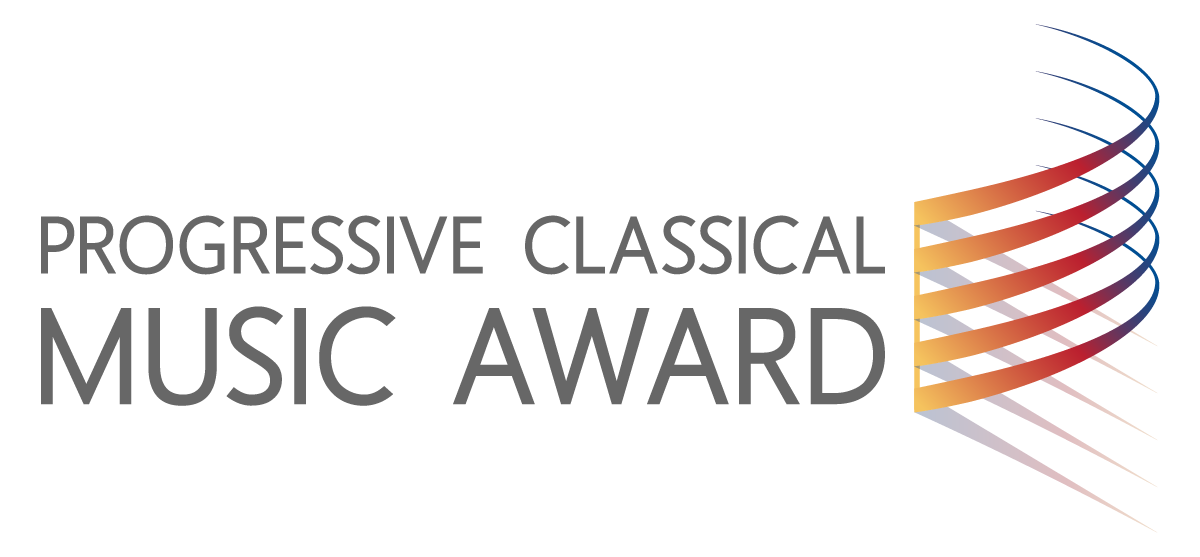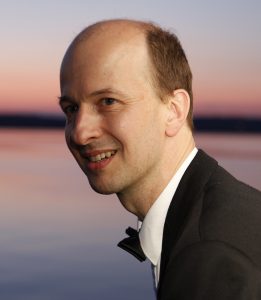 Rainer Bartesch (Germany), born 1964, studied horn, teaching and composition for film and television at the Munich Musikhochschule. He worked for several years as a hornist with renowned orchestras, including the Sächsische Staatskapelle conducted by Giuseppe Sinopoli, before deciding to embark on a career as a composer and conductor.
Rainer Bartesch (Germany), born 1964, studied horn, teaching and composition for film and television at the Munich Musikhochschule. He worked for several years as a hornist with renowned orchestras, including the Sächsische Staatskapelle conducted by Giuseppe Sinopoli, before deciding to embark on a career as a composer and conductor.
The spectrum of his compositional work ranges from concertante classical works to sacred music and music theater to film music including rock, pop, jazz and sound design. He has set over 100 films to music.
As a conductor, he has recorded over 20 orchestral film scores, including “Nowhere in Africa”, which won an Oscar in 2003. He himself plays over 40 instruments – mostly in the recording studio – but also gives concerts with various orchestras in Europe and the USA as an alphorn soloist, for which he had to create his own repertoire because there was none.
In 2007 Rainer Bartesch won the 1st prize for new sacred music at the BR competition Paradisi Gloria in Munich, in 2009 the Silver Edda and the Audience Award at the Pyromusikale in Berlin, in 2010 the Rolf-Hans Müller Prize for the film music for “Erntedank – ein Allgäukrimi” in Baden Baden and in 2016 the Audience Prize at the film festival Flimmern&Rauschen in Munich. Rainer Bartesch has been a member of the European Film Academy since 2015.
Visit his website. Foto by Michael Steine
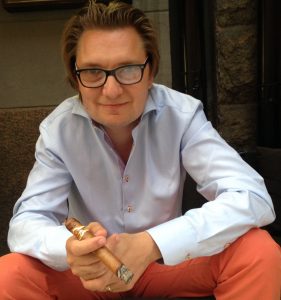 Daniel Berg (Sweden) is a versatile marimba soloist, composer and educator. He holds the position as the percussion and chamber music teacher at the University Colleges of Music in Stockholm, Örebro and Gothenburg (Sweden).
Daniel Berg (Sweden) is a versatile marimba soloist, composer and educator. He holds the position as the percussion and chamber music teacher at the University Colleges of Music in Stockholm, Örebro and Gothenburg (Sweden).
In his passion to promote the marimba as a solo- and chamber music instrument, Daniel has worked intimately with a number of composers who have written original music for the instrument. This includes more than 200 world premiers for solo and chamber works.
As a composer Daniel has written a couple of solo works for marimba like Over the Moon, December and Blue Memories. The pieces belong today to the standard marimba repertoire. His works are published at the Edition Svitzer (Denmark), Norsk Musikforlag AS (Norway) Gehrmans (Sweden) and Keyboard Percussion Publications (USA).
Visit his website, foto by Alice Berg
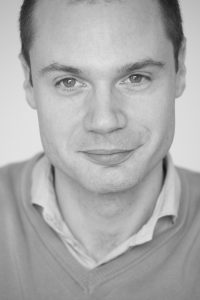 Edmund Jolliffe (UK) studied music at Oxford University and completed a Masters in Film Composition at the Royal College of Music, under Academy Award Winner Dario Marianelli. He also studied on the Advanced Composition Course at Dartington International Summer School and has completed artistic residencies at the Banff Centre, Canada and the Wurlitzer Foundation, Taos, New Mexico. Recent commissions include pieces for The London Festival of Contemporary Church Music, The London Gay Men’s Chorus and pieces for OUP’s ‘Flexible Choral Songs’. His large scale piece ‘Sleep Cycle’ will be premiered in October 2019 by The Nonsuch Singers. This year he was awarded first prize in the 40th Ithaca College Choral Composition Competition and has also won the Renée B. Fisher Composer Award and the Amadeus Song-writing Competition. His music is published by OUP, Stainer and Bell, Banks Music, ABRSM, Reed and Recital Music. Music for TV includes the BBC 1 series ‘Who do you think you are?’, the ITV series ‘Long Lost Family’, Channel Four’s ‘Unreported World’ and the Discovery series ‘Homestead Rescue’. He recently scored ‘Prince, Son and Heir – Charles at 70’ which was shown on the BBC and all over the world.
Edmund Jolliffe (UK) studied music at Oxford University and completed a Masters in Film Composition at the Royal College of Music, under Academy Award Winner Dario Marianelli. He also studied on the Advanced Composition Course at Dartington International Summer School and has completed artistic residencies at the Banff Centre, Canada and the Wurlitzer Foundation, Taos, New Mexico. Recent commissions include pieces for The London Festival of Contemporary Church Music, The London Gay Men’s Chorus and pieces for OUP’s ‘Flexible Choral Songs’. His large scale piece ‘Sleep Cycle’ will be premiered in October 2019 by The Nonsuch Singers. This year he was awarded first prize in the 40th Ithaca College Choral Composition Competition and has also won the Renée B. Fisher Composer Award and the Amadeus Song-writing Competition. His music is published by OUP, Stainer and Bell, Banks Music, ABRSM, Reed and Recital Music. Music for TV includes the BBC 1 series ‘Who do you think you are?’, the ITV series ‘Long Lost Family’, Channel Four’s ‘Unreported World’ and the Discovery series ‘Homestead Rescue’. He recently scored ‘Prince, Son and Heir – Charles at 70’ which was shown on the BBC and all over the world.
Visit his website.
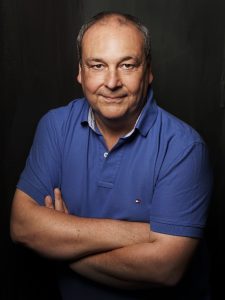 Jürgen Christ (Germany) began his professional career as music editor at Südwestfunk Baden-Baden in 1983 after studying music and German language and literature. There he produced and moderated a large number of radio broadcasts and also played regularly as a pianist in numerous TV talk shows and radio broadcasts. In 1987 he moved to Hamburg, where he worked as a music editor and cultural editor at Radio Hamburg. In 1990 the UFA engaged him as Programme Director Music at the newly founded Klassik Radio, for whose musical concept and programme he was responsible. Starting in 1994, Jürgen Christ produced large interview series lasting several hours for public broadcasters (including Sir Yehudi Menuhin, Sir Georg Solti, Claudio Abbado, Nikolaus Harnoncourt) and managed special cultural and media management projects. For example, he worked as a media consultant for Daniel Barenboim at the Staatsoper Unter den Linden in Berlin and as a cultural manager for Montblanc International. Since 1996, Jürgen Christ has been head of the Music Journalism for Broadcasting and Multimedia course at the Karlsruhe State University of Music, where he was awarded a professorship in Media Management in 2002. In 2010 he was appointed to the chair of KulturMediaTechnologie. In addition to his organizational and teaching activities, Jürgen Christ is also involved in performing music. He composes film and piano music and regularly accompanies singers and instrumentalists as a pianist.
Jürgen Christ (Germany) began his professional career as music editor at Südwestfunk Baden-Baden in 1983 after studying music and German language and literature. There he produced and moderated a large number of radio broadcasts and also played regularly as a pianist in numerous TV talk shows and radio broadcasts. In 1987 he moved to Hamburg, where he worked as a music editor and cultural editor at Radio Hamburg. In 1990 the UFA engaged him as Programme Director Music at the newly founded Klassik Radio, for whose musical concept and programme he was responsible. Starting in 1994, Jürgen Christ produced large interview series lasting several hours for public broadcasters (including Sir Yehudi Menuhin, Sir Georg Solti, Claudio Abbado, Nikolaus Harnoncourt) and managed special cultural and media management projects. For example, he worked as a media consultant for Daniel Barenboim at the Staatsoper Unter den Linden in Berlin and as a cultural manager for Montblanc International. Since 1996, Jürgen Christ has been head of the Music Journalism for Broadcasting and Multimedia course at the Karlsruhe State University of Music, where he was awarded a professorship in Media Management in 2002. In 2010 he was appointed to the chair of KulturMediaTechnologie. In addition to his organizational and teaching activities, Jürgen Christ is also involved in performing music. He composes film and piano music and regularly accompanies singers and instrumentalists as a pianist.
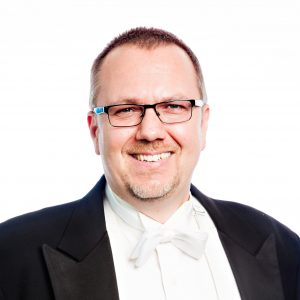 Piotr Szewczyk (US) is a Polish-born violinist and composer. He studied violin with Piotr Milewski, Kurt Sassmannshaus, Dorothy DeLay and Corinne Stillwell, and composition with Joel Hoffman, Michael Fiday, Ricardo Zohn-Muldoon, Henry Gwiazda and Darrel Handel. Dr. Szewczyk holds the degrees of D.M. from Florida State University, B.M. and double M.M. in violin and composition from the University of Cincinnati College-Conservatory of Music. Since 2007 he is a member of the Jacksonville Symphony first violin section. He is also a violinist and composer-in-residence of the Bold City Contemporary Ensemble and the creator of the Violin Futura Project. Previously, he was a fellow at the New World Symphony where he was a rotating concertmaster and a winner of a Concerto Competition. He performed at Carnegie Hall Weill Recital Hall, Colorado Music Festival, Spoleto Festival USA, Aspen Music Festival, Santa Fe New Music, and others. As a composer, Szewczyk has received awards from The American Prize, Project Trio Competition, Flute New Music Consortium Competition, Shuffle Concert Competition, American Modern Ensemble, Third Millennium Ensemble, American Composers Forum, Society of Composers, and others. His chamber music album Bliss Point was released in May 2017 on Navona Records.
Piotr Szewczyk (US) is a Polish-born violinist and composer. He studied violin with Piotr Milewski, Kurt Sassmannshaus, Dorothy DeLay and Corinne Stillwell, and composition with Joel Hoffman, Michael Fiday, Ricardo Zohn-Muldoon, Henry Gwiazda and Darrel Handel. Dr. Szewczyk holds the degrees of D.M. from Florida State University, B.M. and double M.M. in violin and composition from the University of Cincinnati College-Conservatory of Music. Since 2007 he is a member of the Jacksonville Symphony first violin section. He is also a violinist and composer-in-residence of the Bold City Contemporary Ensemble and the creator of the Violin Futura Project. Previously, he was a fellow at the New World Symphony where he was a rotating concertmaster and a winner of a Concerto Competition. He performed at Carnegie Hall Weill Recital Hall, Colorado Music Festival, Spoleto Festival USA, Aspen Music Festival, Santa Fe New Music, and others. As a composer, Szewczyk has received awards from The American Prize, Project Trio Competition, Flute New Music Consortium Competition, Shuffle Concert Competition, American Modern Ensemble, Third Millennium Ensemble, American Composers Forum, Society of Composers, and others. His chamber music album Bliss Point was released in May 2017 on Navona Records.
Visit his website
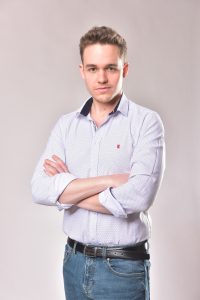 Viktor Molnár (Hungary) is one of the most promising and excellent composers of the young generation from Hungary. Born in 1993, he graduated from the Liszt Ferenc Academy of Music in 2019 as a student of Judit Varga, Bálint Bolcsó and János Vajda. His activities are not limited to contemporary music, as he is active in pop music and popular genres, and he is also involved in theater- and art-projects. He thinks of himself as a creative artist in all aspects and therefore he is also a stage performer. His works have been featured in numerous programs of domestic concert venues, including the Liszt Academy, the Palatine Hall, the Palace of Arts, the Óbuda Society, and also for foreign performances in Vienna and Milan. Numerous performances of his compositions have been played by the Anima Musicae Chamber Orchestra, and the cooperation with Péter Dobszay, a prominent representative of the young conductor generation, led to successful productions. Currently he is a teacher at Leó Weiner Music High School and György Kroó School of Music and Fine Arts. Among his many achievements there is the first prize in the Piano Accompaniment Song category of the Arany János Composer Competition 2018 and the third prize at the composer competition of Scuola Internationale Musica in Milan 2019.
Viktor Molnár (Hungary) is one of the most promising and excellent composers of the young generation from Hungary. Born in 1993, he graduated from the Liszt Ferenc Academy of Music in 2019 as a student of Judit Varga, Bálint Bolcsó and János Vajda. His activities are not limited to contemporary music, as he is active in pop music and popular genres, and he is also involved in theater- and art-projects. He thinks of himself as a creative artist in all aspects and therefore he is also a stage performer. His works have been featured in numerous programs of domestic concert venues, including the Liszt Academy, the Palatine Hall, the Palace of Arts, the Óbuda Society, and also for foreign performances in Vienna and Milan. Numerous performances of his compositions have been played by the Anima Musicae Chamber Orchestra, and the cooperation with Péter Dobszay, a prominent representative of the young conductor generation, led to successful productions. Currently he is a teacher at Leó Weiner Music High School and György Kroó School of Music and Fine Arts. Among his many achievements there is the first prize in the Piano Accompaniment Song category of the Arany János Composer Competition 2018 and the third prize at the composer competition of Scuola Internationale Musica in Milan 2019.
Visit his website
